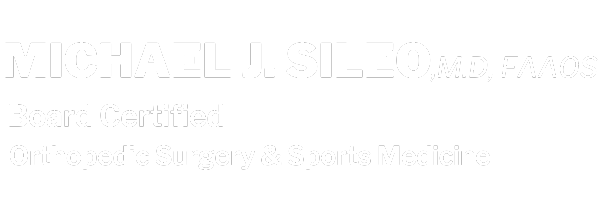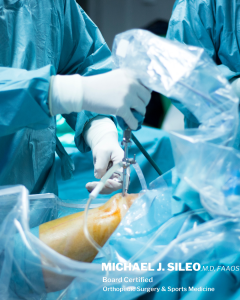A meniscal tear is one of the most common knee injuries, particularly among athletes and active individuals. The meniscus is a crescent-shaped cartilage in the knee joint that provides cushioning and stability. When it tears, it can cause pain, swelling, and limited mobility. Meniscal injuries can occur due to a sudden twist or turn, especially in sports-related activities. Whether you’ve sustained a meniscus tear due to a sports injury or age-related wear and tear, understanding the importance of proper treatment can help you regain strength and mobility. If you’re in pain and think you may have a meniscus injury, seeing an orthopedic surgeon in Commack, NY, is the first step toward relief. Dr. Michael J. Sileo specializes in diagnosing and treating musculoskeletal injuries, including meniscal tears, and offers treatment options to help you heal.
What is Meniscal Repair?
Meniscal repair refers to the surgical procedure used to treat a torn meniscus. A meniscal tear is one of the most common injuries seen by orthopedic surgeons, especially among athletes and active
individuals. The meniscus is a wedge-shaped cartilage in the knee joint that acts as a cushion, absorbing shock and stabilizing the knee. When damaged, it can cause pain, swelling, stiffness, and limited mobility. Meniscal tears can occur from a sudden twist, turn, or overuse, and if left untreated, can lead to further complications like arthritis, bone fractures, or even a need for knee replacement surgery. If you’re dealing with knee pain, it’s time to see an orthopedic surgeon in Commack, NY, to discuss your treatment options. At Dr. Michael J. Sileo’s practice, we specialize in diagnosing and treating musculoskeletal injuries, including meniscal tears. As a leading orthopedic doctor on Long Island, Dr. Sileo offers both surgical and non-surgical options to help you recover fully.
Common Causes of Meniscal Tears
Meniscal tears can occur due to several reasons, including:
- Sports Injuries: Athletes often suffer from meniscal tears due to sudden, forceful movements like twisting, turning, or pivoting. Sports like football, basketball, and soccer are common contributors to this injury.
- Overuse: Repeated stress on the knee joint over time can result in degeneration of the meniscus, leading to tears.
- Trauma: A direct blow or forceful impact, such as in a car accident or a fall, can damage the meniscus.
- Aging: Over time, the meniscus can become more fragile and prone to tears, even with normal wear and tear.
Seeing a board-certified orthopedic surgeon early is crucial to avoiding further damage to the knee and reducing the risk of arthritis and instability in the joint.
Types of Meniscus Tears
There are several types of meniscus tears, including:
- Horizontal Tears: A tear that runs parallel to the tibial plateau. These are often repairable through meniscal surgery.
- Vertical Tears: These tears are perpendicular to the tibia and can be treated through repair if located in the vascularized area of the meniscus.
- Complex Tears: Involving multiple tear patterns, complex tears are often difficult to repair but can be addressed using advanced techniques.
- Degenerative Tears: More common in older adults, these tears are caused by the gradual breakdown of the cartilage due to aging.
Your orthopedic doctor will assess your injury using advanced imaging techniques like X-rays or MRIs to determine the best course of treatment.
Meniscal Repair Procedure
Meniscal repair surgery is commonly performed using arthroscopy, a minimally invasive procedure that uses small incisions and a camera to guide the surgeon in repairing or removing the damaged tissue. Arthroscopy is a preferred technique because it reduces recovery time and scarring and minimizes the risk of complications compared to traditional open surgery.
The meniscus may be repaired using stitches or, in some cases, a procedure known as meniscal transplant, where damaged tissue is replaced with donor tissue. This option is typically reserved for younger patients who have significant damage to the meniscus.
Benefits of Meniscal Repair
Meniscal repair aims to preserve the natural function of the knee joint, providing long-term benefits. Some of the key advantages include:
- Improved Knee Stability: Repairing the meniscus restores the stability of the knee joint, reducing the risk of further injury.
- Pain Relief: Proper repair of the meniscus helps alleviate pain caused by bone-on-bone friction.
- Reduced Risk of Arthritis: Preserving the meniscus prevents the joint from deteriorating and helps reduce the risk of osteoarthritis in the knee.
- Minimized Need for Knee Replacement Surgery: By repairing the meniscus, patients may avoid the need for more invasive surgeries like total joint replacement in the future.
Recovery and Rehabilitation
The recovery time for meniscal repair can vary depending on the type of tear and the procedure performed. Recovery times typically range from 6 to 12 weeks, with more serious injuries requiring up to 6 months of recovery for a full return to normal activities.
Initially, after surgery, you will need to rest and limit the use of your knee. During this phase, it’s important to avoid high-impact activities, as these can delay healing. Your orthopedic surgeon will likely recommend physical therapy to help strengthen the knee and restore mobility. Physical therapy is crucial to regaining strength in the group of muscles and tendons surrounding the knee, ensuring the joint heals properly.
The goal of physical therapy is to help patients regain full range of motion and reduce the risk of future injuries. Depending on the extent of the tear and the type of surgery, recovery may involve the use of crutches for a period of time, and in some cases, wearing a knee brace. Patients will typically begin walking without crutches within a few weeks after surgery, but it may take months to return to more strenuous physical activities like running or sports.
When to See an Orthopedic Surgeon in Commack NY
If you experience any of the following symptoms, it’s important to contact an orthopedic surgeon near Commack, NY, for a thorough evaluation:
- Knee pain that persists despite rest
- Swelling and stiffness in the knee joint
- Limited range of motion or difficulty straightening the knee
- A sensation of the knee locking or catching during movement
- A feeling of instability or weakness in the knee
If any of these symptoms are present, it may be time to schedule an appointment with an experienced orthopedic surgeon. Early diagnosis and treatment are key to managing knee injuries and preventing further complications. Whether you’re dealing with a torn meniscus, ACL reconstruction surgery, or another knee issue, our team offers comprehensive orthopedic care to get you back to doing the things you love.
Why Choose Dr. Michael J. Sileo?
Dr. Michael J. Sileo is one of the best orthopedic surgeons in Commack, NY, specializing in sports medicine, knee surgery, and arthroscopic procedures. With a focus on orthopedics surgery and sports medicine, Dr. Sileo and his team are dedicated to helping you recover and return to normal activities as quickly as possible. Whether you’re dealing with a sports injury, degenerative condition, or trauma-related meniscus injury, we are here to provide the highest standard of orthopedic care.
Contact Dr. Sileo For an Orthopedic Surgeon in Commack, NY
If you think you may have a meniscus tear or another knee injury, don’t hesitate to book your appointment with an experienced orthopedic surgeon near Commack, NY. Meniscal tears can lead to long-term damage if not properly treated, but with the right care, you can regain strength and return to your active life.
Our board-certified orthopedic specialists are here to provide the best orthopedic care possible. Whether you need surgical intervention or non-surgical treatments, we are committed to helping you heal properly and get back to your normal activities. Contact us today to schedule an appointment and take the first step toward recovery.



